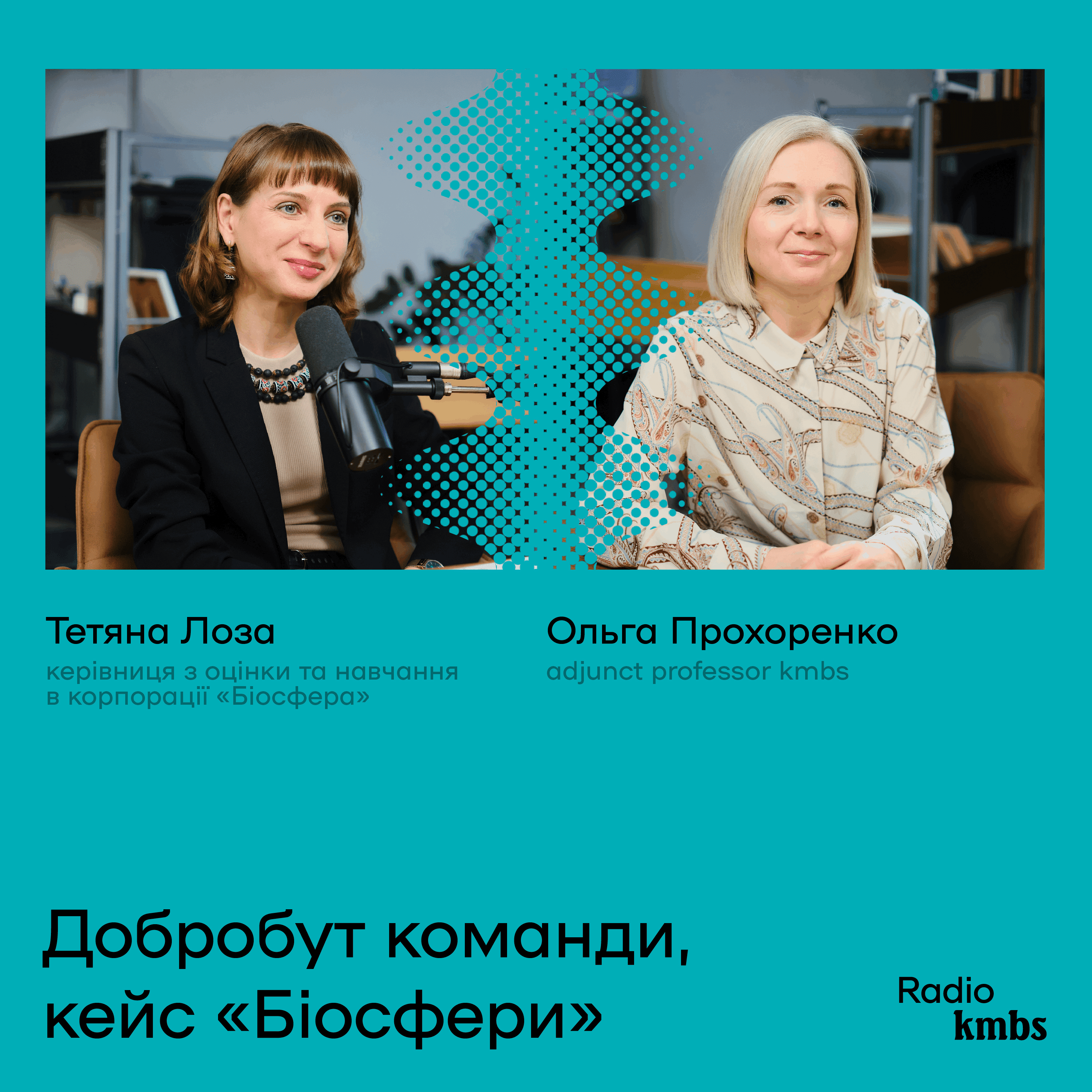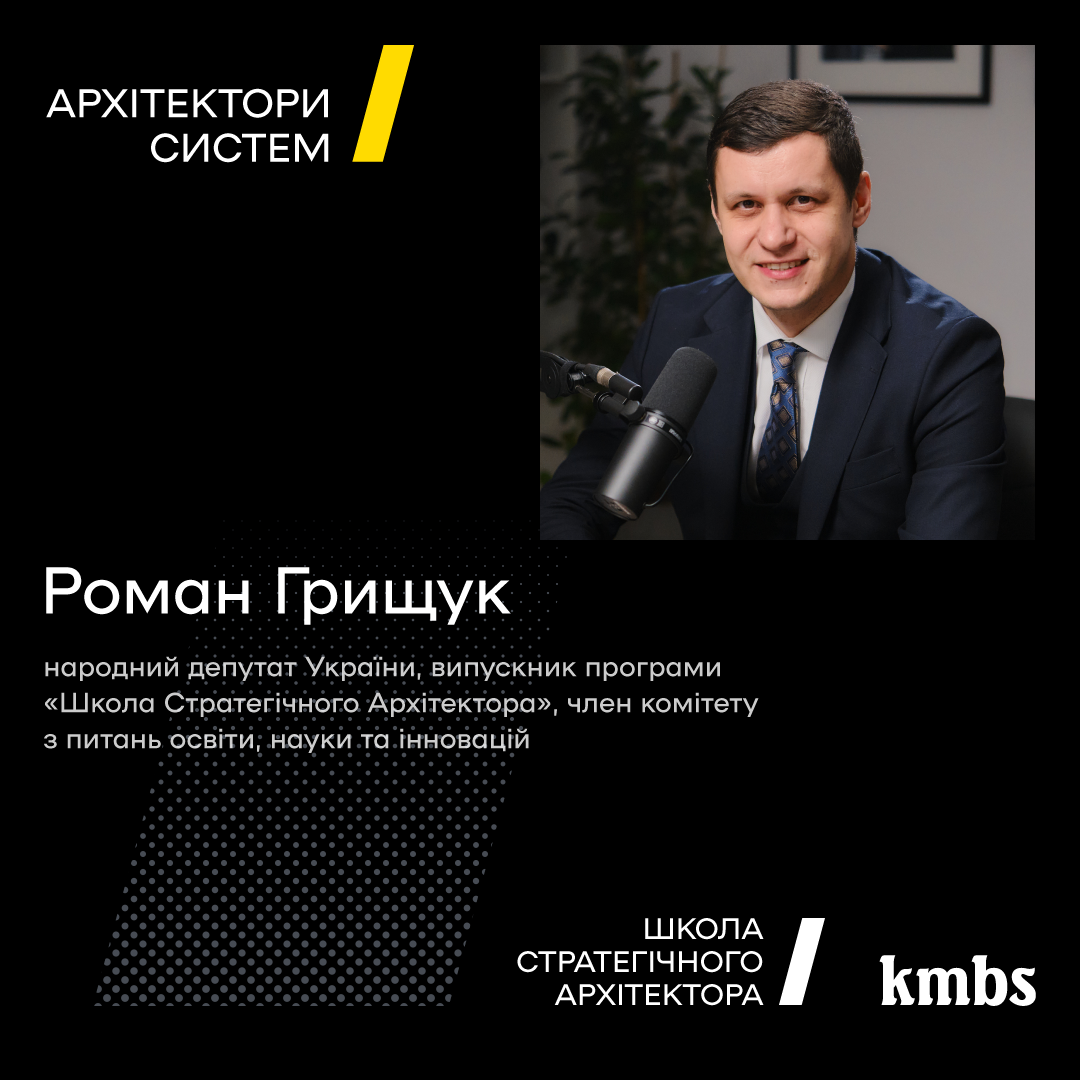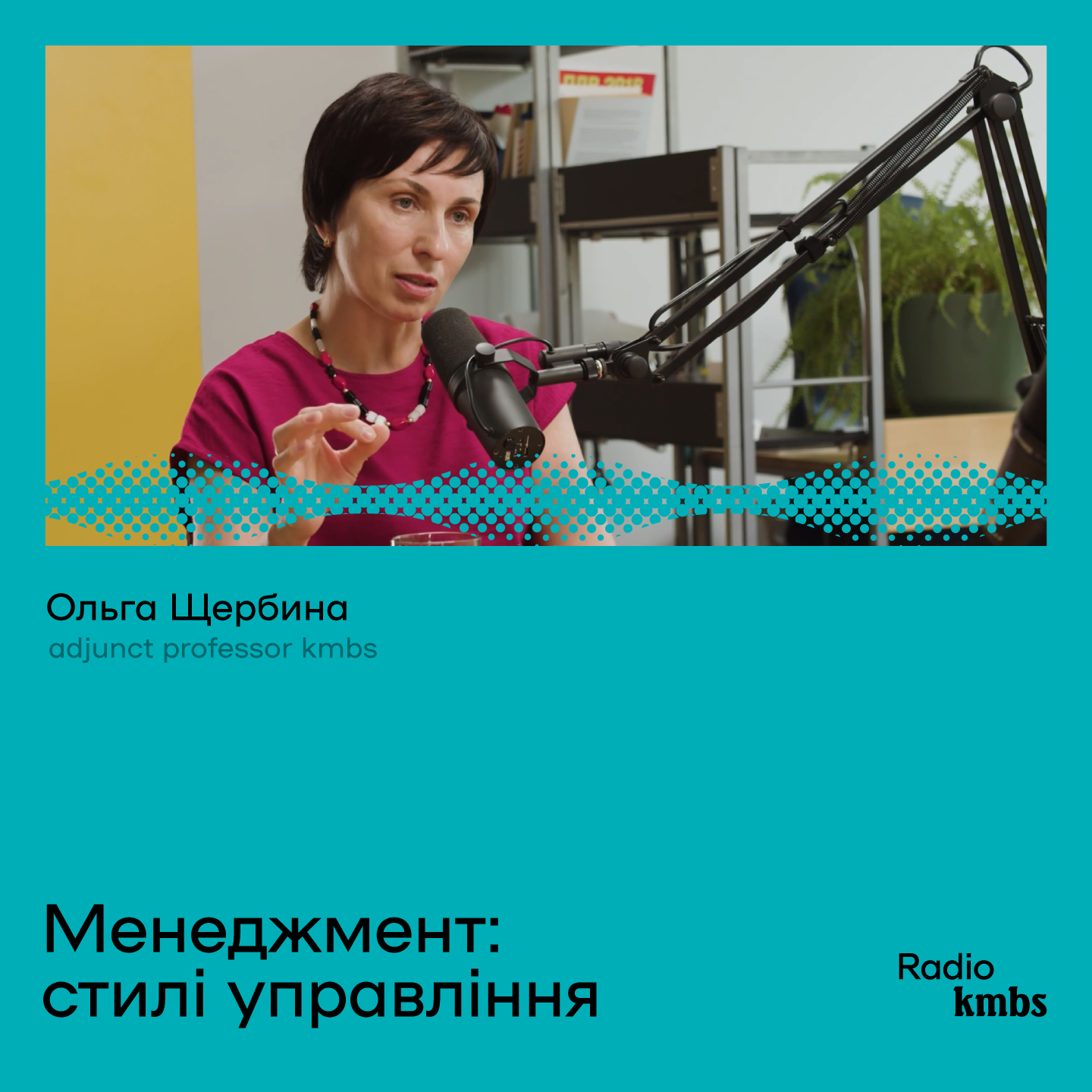Learn first
KMBS latest news in real time

For the latest KMBS events and news, visit KMBS Live at the top right corner of the screen
Open kmbs live 17.10.2022
17.10.2022 2649
2649 15min
15minTell us about yourself. When and where did your entrepreneurial story begin?
Vitaly Syomka: I was born in Kryvyi Rih. He moved to Kyiv five years ago. At 13, I lost my mother and was left with only my father. We lived poorly, and I went to work very early. Worked in construction as a salesman and installed security systems... I realized that you wouldn't earn that much, so I started my own business at the age of 17.
What brought you to business school? What was your inquiry?
V.S.: I have studied self-development for as long as I can remember. Through books, environment, courses, and clubs of entrepreneurs. But an accident pushed me towards long-term deep learning.
Once a friend of mine told me about kmbs and the fact that they hold a get-to-know-you breakfast in Dnipro. Together we decided to go and have a look (at that time, I was still living in Kryvyi Rih). After that, he went to study for an MBA, and I decided to watch from the side. I could learn by myself. However, after a year, I saw how my friend began to change. Then another friend of mine went to study at kmbs. Both had warm reviews.
In the end, I decided to apply for myself. At the interview, I was asked why I wanted an MBA, and said, "I want to build a billion-dollar company." And I was refused. They said: come in a year, you have the wrong request. I was even offended: how is it I came? I'll give you the money!
Another year passed. My friends continued to transform, and I saw that my business, although there was momentum, did not have such a powerful push as theirs. Then I wanted to go to kmbs even more, applied again, wrote an essay, passed an interview — and entered the MBA program.
What value did you get?
VS: For me, kmbs is fundamental training. But only those who are ambitious, open to new things, and ready to dive deep can get an effect from it. If it is, the school turns on everything in you to the maximum.
I had a lot of insights during my studies, for example, about the fact that it is necessary to select people according to values. If a person does not show results, do not break him, then you will not include him. That all people need to be significantly involved in the ordinary mental field when scaling. Build open systems. Cooperate not only with business but also with the state, and science, build ecosystem solutions, and involve other players.
Throughout your studies, you will be provoked with uncomfortable questions. You go home and think: "why do I need it?" but the question continues to ring in your head because it sticks. And here, an internal conversation begins, in which the most important thing is, to be honest with yourself.
I liked the "fifth day" when we met with artists, journalists, writers, and philosophers — it was a solid source of insights. What is only Volodymyr Pylypovich Morenets worth? I consider him my teacher. I often stayed after the couples and asked him about everything we covered in class. I learned to love Ukraine and understand people from him. I learned systems thinking from Eduard Maltsev. And from Oleksandr Savruk — to build a strategy and client dimension.
I was slow to make changes when I was learning, and in general, for the first seven or eight months, I was critical of everything I heard at kmbs. He often said: "it's impossible!", "it doesn't work like that!" and argued. And then, I was turned upside down, and other extremes began: I delayed teachers after lectures and demanded more knowledge and discussions.
How has your business changed in recent years?
V.S.: Our group's training fell during the lockdown period: we started in November 2019, and since March, we have already introduced quarantine. Businesses began to pour in, and it was necessary to combine study and work. That's why I consider my teammates to be superhumans! And now, with the beginning of the war, a new, more powerful challenge has arisen, and the pandemic already seems like just a fairy tale.
My company Anteniti also found itself in a difficult situation during the pandemic. We import telecommunications equipment, and the borders with China have been closed. Therefore, we had to move to another area for a while and then, when the situation stabilized, return to the main activity. The beginning of the war also became difficult, but we are working despite everything.
I had many different projects. After 2014, I realized that it is necessary to build a business not only in Ukraine. I was very impressed by the stories of companies from Japan, South Korea, Israel, and Taiwan. They inspired me. I read a lot of information and books (I liked "Why Asia Succeeded," "Cultural Map," and "Barriers of Intercultural Communication in Business"). No one sees the native market as the main one because the countries are small. Therefore, everyone creates highly competitive business models for export. This became one of my criteria for starting a new project.
After training, I did not return to the operational management of my main business. I kept it afloat during the quarantine and handed it over to the operations director. The company even began to grow. We created our brand. Now we are taking steps to export, in particular, we have already made several deliveries of products to Europe and Africa. And all this happened without me. And I focused on a new startup.
Was there resistance from the team to your exit from operations management?
V.S.: It happened somehow organically for us. My team and I went to the Carpathians. I told them about my new project idea and told them I was leaving operations management. They held a strategic meeting of the board of directors, set goals, and scheduled half-yearly sessions.
What new business have you decided to build?
V.S.: I have always been interested in the field of I.T., and from the age of 17, I was engaged in something related to the Internet. There were attempts in the projects of Internet provisioning, creation of sites to order, and SEO promotion. But it happened in "hard" and not "software" I.T., And I wanted to create a "software" product company with significant added value immediately for export.
For six years, I was looking for ideas and trying to make startups with my own money without attracting investments. These were startups in the field of e-commerce and IoT hardware. That's how I studied. Three years ago, I somehow found an article about EdTech, online learning. I started researching this topic. And he was able to approach her when he was preparing his master's thesis in the MBA program.
For me, this work was not just a task but the embodiment of my general idea, a significant dream. I decided to create an online school, the JayJay platform, where adults can get an I.T. profession (as a first or second) and help with employment. That is the thorough program for complete retraining of sweaters. We will also offer short advanced training courses so that students can try themselves in a new field from scratch, and specialists can train new skills.
I chose Indonesia to launch my startup.
And why Indonesia?
VS: I never did a deep analysis, which was probably my mistake in all previous startups. Here I decided to do something different, closed for two months, and started analyzing potential markets, competitors, etc.
I saw an attractive business model for a startup in Brazil. In 2.5 years after entering the market, its capitalization was more than $100 million. So, I understood that this model was super successful. It remained to choose the market on which to start. I had a hunch that the next EdTech boom would start in developing countries like Brazil.
All my criteria came together: to launch an export-oriented business model, to offer a service product rather than a physical one, and to do it in the field of online learning, which I have been passionate about in recent years.
How did the war change your plans, and what is the state of affairs now?
V.S.: By February, we already had time to sign contracts with experts who started creating training programs. They started building the Indonesian team. In general, before the war, we already had a legal structure and financial and business model and were preparing training courses for the launch. We were preparing not just to build an MVP but to get a product that could be sold immediately, to show potential investors the first sales, and attract investments.
When the war started, the first part of the team was actively involved in volunteering, and the other part joined the IT ARMY of Ukraine. But they did not forget about business either, because it is essential for us and supporting the economic front. We currently have four courses on our platform: Digital Marketing, UX Writing, Software QA engineering, and Digital Illustration. And soon, we will launch two more — Web Developer and Interior Design.
In August, JayJay won an Amazon Web Services (AWS) competition: we entered the top 20 startups and received $25,000 for AWS cloud solutions. And in September, they attracted $1 million in seed-round investment from Jooble Venture Lab, the startup studio of the job aggregator Jooble. In addition to money, Jooble will help us with marketing and technology, including Data Science.
In previous startups, you always invested only your own money. Why did you decide to attract external capital now?
V.S.: I understood how the new digital economy works during my studies. And I realized that I could do what I wanted only with the help of a venture model. It is like the fuel that allows a rocket to take off. With its use, you can quickly scale and capture the market.
There is a rule in the venture capital market: there are no rules. There is only a specific frame. I can give 10% to the company, 20%, etc., for the same amount. There is an anomaly. It is more than 25%. Everything depends on the business model, the market, and the team. But the most important thing is to show investors not just MVP but sales and income (so-called traction).
Not everything that works in Ukraine works in Indonesia. Do you already have the first conclusions: which hypotheses about doing business in Indonesia have been confirmed and which have been refuted? Do you have insights?
V.S.: At first, I thought that I would be able to start in six months. I wanted to launch a startup quickly, so I looked for ways to do it. Is it enough to launch a landing page with a course and pour traffic? It turned out not. Indonesia has local payment systems and banking, so Indonesian customers refuse to pay money to international wallets or international online transfers. Therefore, we opened a legal entity in Indonesia to register with the local financial systems. But will investors want to "land" money in Indonesia? Most likely, no. Therefore, part of the time was spent on building the legal structure and incorporation of the holding company. So half a year turned into a year.
Already now, I understand that we have filled a lot of ghouls. For example, I didn't think we would have a problem getting local teachers to create educational products. And at the first stage, it was necessary to devote more time to this. It turned out that Indonesians have a specific attitude towards Europeans. For example, they somehow believe that we have unlimited money, so they ask for space royalties.
On the other hand, Indonesians think we are very demanding, so they are afraid to cooperate with us. Finding a blockbuster topic for a course is one necessary process, but for it to take off, you must find and negotiate with star teachers who work at top technology companies. This is the bottleneck of online education.
Cultural differences also have a strong influence. Let's say they practically don't say "no." Most Indonesians promise and then don't do it — or they can disappear altogether, even though we have already signed a contract. This is what happened to one of our teachers. And they don't pick up the phone, even though they left an application on the website.
Is the trust problem likely to make sales more difficult?
V.S.: For this, we are building an Indonesian sales department with Indonesian salespeople. We localize everything as much as possible. We join various associations. We collect feedback from graduate students and post their stories on social networks. We are preparing a P.R. campaign. Trust in them is difficult, it must be built, and we do it systematically, from month to month.
JayJay is the first public Ukrainian startup in Indonesia, so we are pioneers. It is pretty tricky because the mentality and rules of the game are very different from the Ukrainian ones. When I interview candidates for the team, I immediately try to identify adventurers and adventure seekers. Only such people can search and find new solutions. We are building a startup that will change the lives of thousands of people. Through affordable online learning, they will be able to get high-paying jobs in the new digital world that is growing exponentially. This is our mission and motivation.










